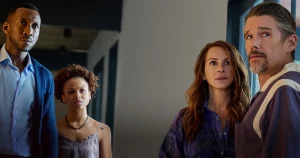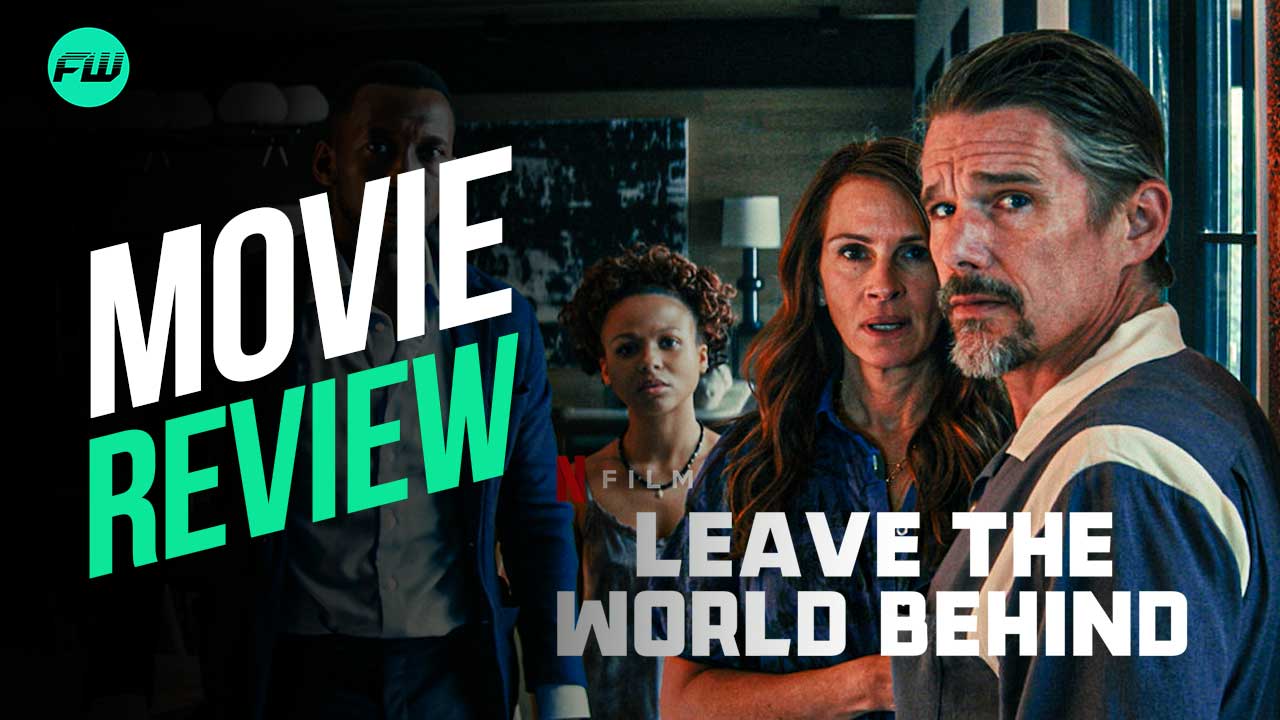Leave the World Behind brings together the creative forces of Sam Esmail, the mind behind one of my favorite series of the last decade, Mr. Robot, and the thought-provoking novel of the same name by Rumaan Alam. As an avid fan of Esmail’s intricate storytelling and exceptional filmmaking skills, the prospect of him helming a feature film set in an apocalyptic landscape fueled my excitement. The movie weaves a tale of familial bonds tested in the crucible of an impending crisis, exploring the depths of human relationships against the backdrop of a collapsing world.
Leave the World Behind Plot
The premise is nothing out of the ordinary within the genre: Amanda (Julia Roberts) and Clay (Ethan Hawke) take their two kids, Rose (Farrah Mackenzie) and Archie (Charlie Evans), on a family vacation on Long Island, which quickly takes a surreal turn when unexpected visitors, George H. Scott (Mahershala Ali) and his daughter Ruth (Miha’la), intrude with news of a mysterious blackout. The families find themselves entwined in a gripping narrative, forced to confront the tensions of a world succumbing to chaos.
The Critique

Also Read: The Culprits Review – A Big, Sick Crime Thriller
Esmail’s adaptation partially departs from Alam’s source material, transforming Leave the World Behind into a more straightforward apocalyptic thriller despite keeping its thematic focus. The filmmaker introduces many explicit sequences explaining what’s happening without falling into lazy exposition or disrespect for the audience, ultimately contributing to a heightened sense of intrigue and entertainment. While some deviations might be perceived as veering into cliché territory and adhering to typical world-ending formulas, Esmail manages to strike a commendable balance. Each character carries the overarching themes of the story, with the film exploring how they navigate the complexities of family dynamics, societal issues, and the uncertainties presented by the crisis. The characters’ backgrounds, personalities, and choices serve as vehicles for exploring broader themes within the movie.
Therefore, Leave the World Behind is really defined by its thematic richness. The exploration of how individuals and families grapple with the unknown becomes a canvas for illustrating the profound impact of fear and uncertainty on human behavior in times of emergency. In essence, it becomes a psychological study, using the characters as instruments to dissect the multifaceted ways in which fear can shape and define the human condition. The narrative backdrop serves as a lens through which the film scrutinizes the strength and fragility of family relationships, laying bare the vulnerabilities within these affinities, emphasizing their resilience in the face of adversity but also acknowledging the fissures that can emerge under the weight of the unknown.
Leave the World Behind also serves as a reflective mirror held up to our current culture. The analysis of extreme technological dependency resonates as a timely commentary on its pervasive role in our lives. The characters’ reliance on information and communication devices not only underscores the immediacy of the crisis but also exposes the overwhelming anxiety that stems from this addictive connection.
The societal mistrust is yet another layer peeled back, revealing the fractures in human ties. Leave the World Behind perfectly exemplifies the reactive posture with which individuals engage with differing viewpoints, highlighting the polarized nature of discourse in today’s world. All of these topics merge together to ultimately, and in surprisingly underwhelming fashion, transmit a rather simplistic, cautionary message about the fragility of human connections when faced with existential threats, leading to a world that’s inevitably going to doom itself.

Nevertheless, the ensemble cast is outstanding across the board. The brilliant Julia Roberts (Ticket to Paradise) and the charismatic Mahershala Ali (Moonlight) stand out from the pack, handling complex monologues with ease. Ethan Hawke (The Northman) and Miha’la (Bodies Bodies Bodies) are equally compelling. Charlie Evans (Everything’s Gonna be Okay) struggles with portraying a more thinly developed character, but on the other hand, Farrah Mackenzie (Logan Lucky) offers a notable display, adding depth to an underlying message about finding happiness in life’s simpler pleasures, as exemplified by her character’s unwavering dedication to the TV show Friends.
Tod Campbell’s (Mr. Robot) cinematography is unquestionably magnificent and truly impressive, but it occasionally borders on overwhelming distraction. Esmail’s inclination for unconventional shots, constantly transitioning through windows, doors, and walls, definitely adds thematic meaning to Leave the World Behind but risks becoming a visual hindrance rather than an enhancement, especially when using crooked angles in moments where the viewers genuinely wish to be able to see what’s happening without having to turn their heads. The pulsating score from Mac Quayle (Mr. Robot) successfully punctuates the movie’s growing tension, contributing to the overall immersive experience.
A few pacing issues dilute the sense of urgency needed to complement the escalating tension. The narrative sparsely stumbles across believability factors, as well as a handful of repetitive scenes, notably those featuring the symbolic deers, that tend to belabor messages already well understood. Overall, it will likely evoke divisiveness amongst audiences, but hopefully, most will see past these issues and rejoice at the quite interesting psychological study at hand.
In Conclusion
Leave the World Behind intricately intertwines Sam Esmail’s directorial finesse with Rumaan Alam’s thought-provoking source material, delivering a compelling exploration of familial dynamics, societal issues, and the impact of fear and uncertainty on human behavior. While Esmail’s adaptation steers towards a more straightforward apocalyptic thriller, it retains thematic depth, as the layered characters, portrayed by a stellar ensemble cast with Julia Roberts and Mahershala Ali as brilliant standouts, serve as compelling conduits for these themes, offering nuanced reflections on contemporary society. Exquisite cinematography and a pulsating score contribute to a tense, immersive experience, despite occasionally distracting camera work, some pacing issues, and repetitive narrative elements. In the end, it’s a profoundly interesting cautionary tale that everyone should see before the year’s end.
7/10

Follow us on Facebook, Twitter, Instagram, and YouTube for more entertainment coverage.



